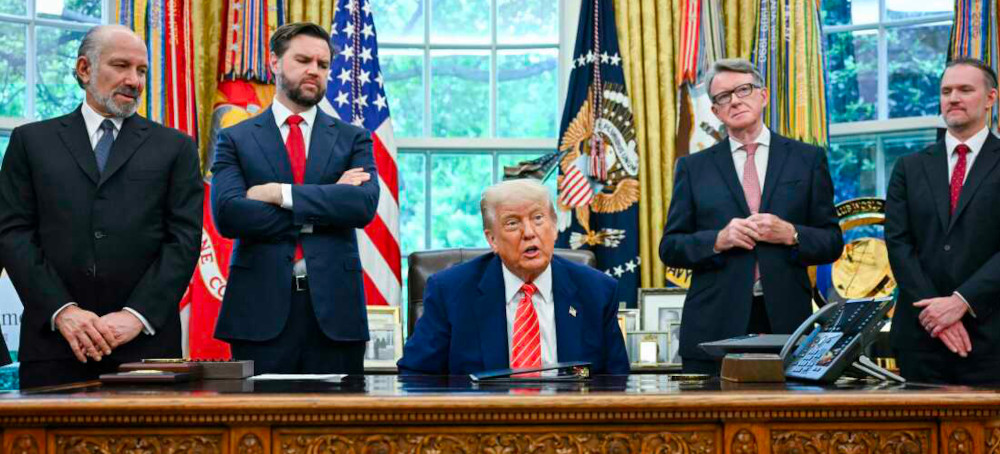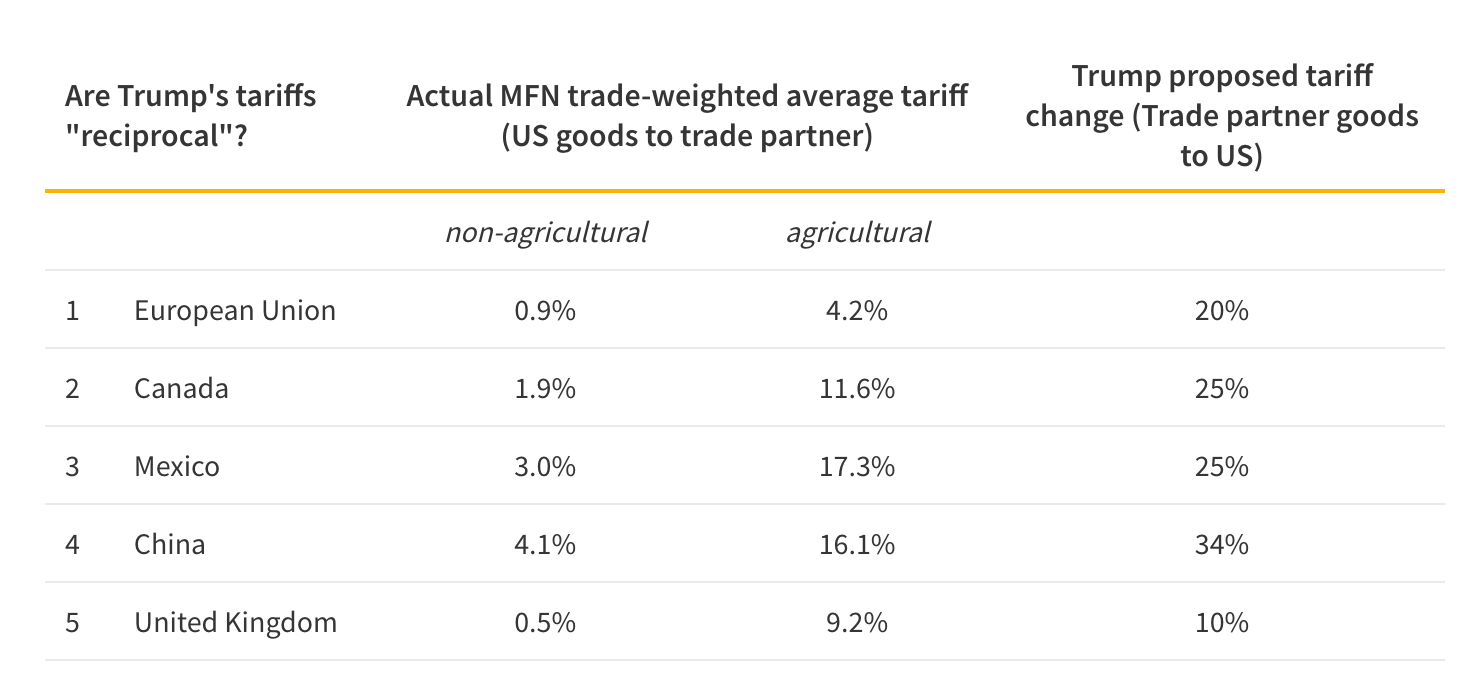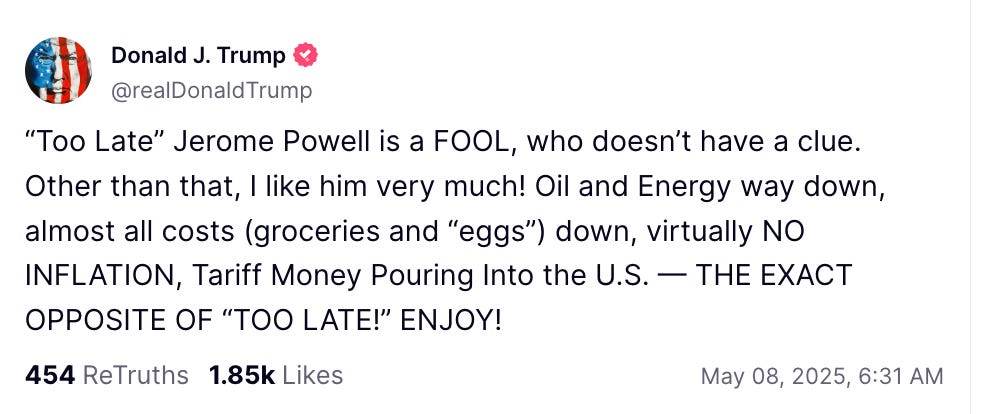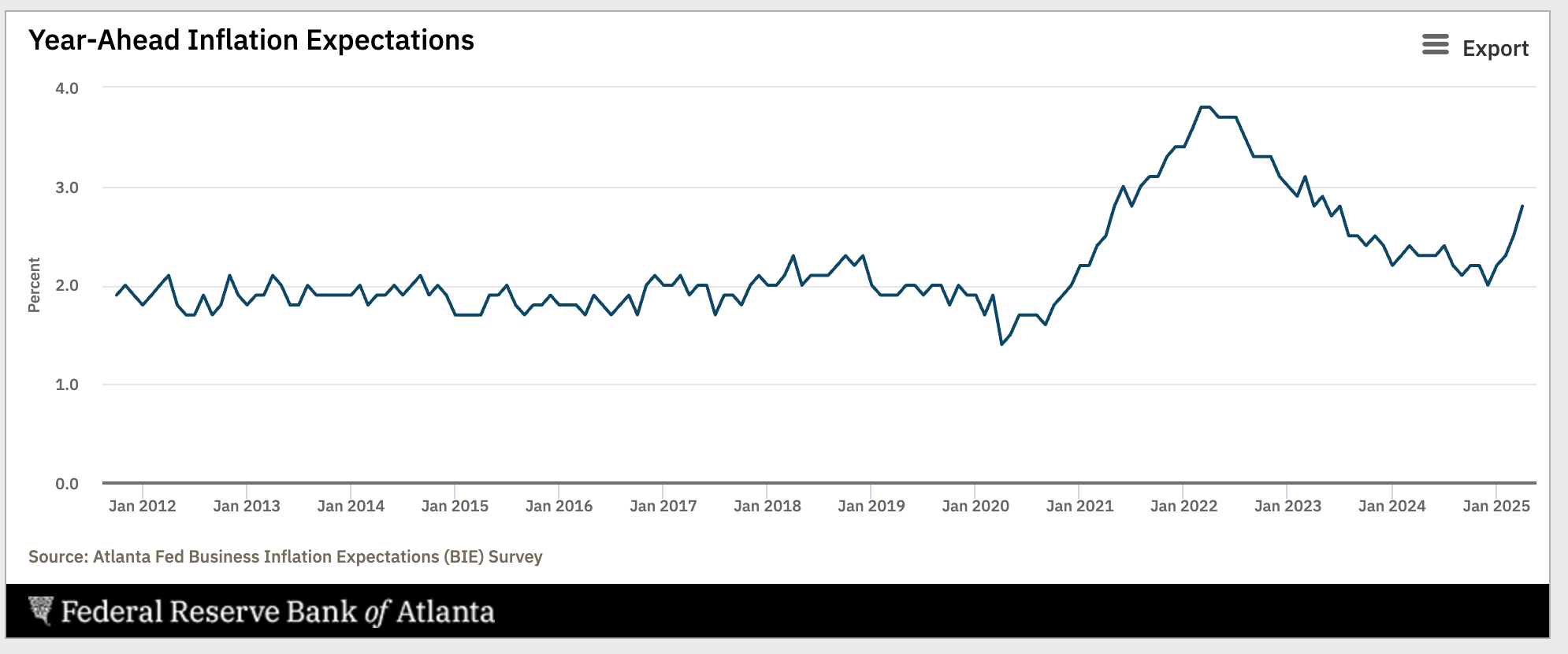Why You Shouldn’t Get Excited About Trump's “Deals”
Paul Krugman Substack President Trump announces a trade agreement with the United Kingdom on May 8, 2025 as Commerce Secretary Howard Lutnick, Vice President Vance, British Ambassador Peter Mandelson and U.S. Trade Representative Jamieson Greer look on. (photo: Jim Watson/AP)
President Trump announces a trade agreement with the United Kingdom on May 8, 2025 as Commerce Secretary Howard Lutnick, Vice President Vance, British Ambassador Peter Mandelson and U.S. Trade Representative Jamieson Greer look on. (photo: Jim Watson/AP)
Why you shouldn’t get excited about his “deals”
In other words, this will be smoke and mirrors, an attempt to persuade the gullible that Trump’s tariffs are actually working. Markets — driven by small investors who seem desperate to believe that the people in charge have some idea what they’re doing — may briefly bounce on the announcement.
Trump, however, has already declared that the tariff that really matters right now, the prohibitive 145 percent rate on imports from China, won’t be coming down. That tariff has already caused a 30-40 percent drop in the volume of US-China trade, which, given the time it takes to ship stuff, guarantees a sharp increase in consumer prices and possibly empty shelves a few weeks from now.
But back to that UK “deal.” Nobody knows what will eventually come out of it, but we can be sure of one thing: It won’t lead to any significant opening of the British market to U.S. goods. Why? Because that market was already wide open before Trump stomped in.
The most important thing to understand about Trump’s trade war is that it’s an attempt to solve a problem that only exists in his imagination. He keeps insisting that other countries are engaged in unfair trade, but the reality is that most of our important trading partners impose very low tariffs on U.S. products:

You could argue that China is less open to trade than the tariff number suggests, because the government plays such a large role in the Chinese economy. But for Britain, Canada and the European Union Trump’s tariffs are a huge, destructive attempt to fix something that wasn’t broken. These nations can’t stop doing bad stuff on trade because they weren’t doing bad stuff before Trump came along.
What about America’s trade deficit? As economists have repeated ad nauseam, this deficit doesn’t reflect unfair foreign trade policies. It is, instead, the flip side of large flows of capital into the United States, which historically reflected the fact that the U.S. was perceived as an attractive place to invest. Even if Trump manages to score some actual deals, as opposed to concepts of deals, they won’t change that logic. If his strategy does manage to reduce the trade deficit, it will do so only by destroying America’s attractiveness to foreign investors, which may be an achievable goal.
But let me go back to the point that Trump’s tariffs are a response to a problem that didn’t exist. That’s actually an observation that goes beyond trade policy. The Trump team likes to claim that it inherited an economy in terrible shape. Scott Bessent, the Treasury secretary, keeps claiming that the economy needs a “detox.”
In fact, however, when Trump took over the U.S. economy was in very good shape. Unemployment was around 4 percent, while inflation was at most a fraction of a percentage point above the Federal Reserve’s target of 2 percent. Our productivity growth was the envy of the world. We had a trade deficit, but as I said, this mainly reflected America’s attractiveness as a place to invest.
It's true that Goldilocks now seems to be leaving the building, but that’s entirely — entirely — due to Trump himself. In discussing the Fed’s decision to leave interest rates unchanged, Jerome Powell repeatedly talked about “uncertainty,” but the only reason things seem much more uncertain now than they did a few months ago is the chaos Trump has created.
And stuff like this doesn’t help:

Actually, I’m baffled by the quotation marks around “eggs.”
Anyway, aside from the attempt to bully the Fed, you should be worried by Trump’s evident disconnect from reality. Prices are, in fact, going up, with a notable upturn in the inflation expected by businesses:

So what will Trump do if, as seems likely, Monday’s report on consumer prices shows the first signs of accelerating inflation? Even more important, what will he do when the cutoff of imports from China really hits consumers? There’s no chance that he will admit that he was wrong. There’s a very good chance that he and his minions will soon begin trying to corrupt the economic data.
So should we celebrate the trade deal that will be announced today? No. It won’t solve any of the problems Trump has created. It will, if anything, offer Trump the temporary illusion of success, encouraging him to create even more problems.



